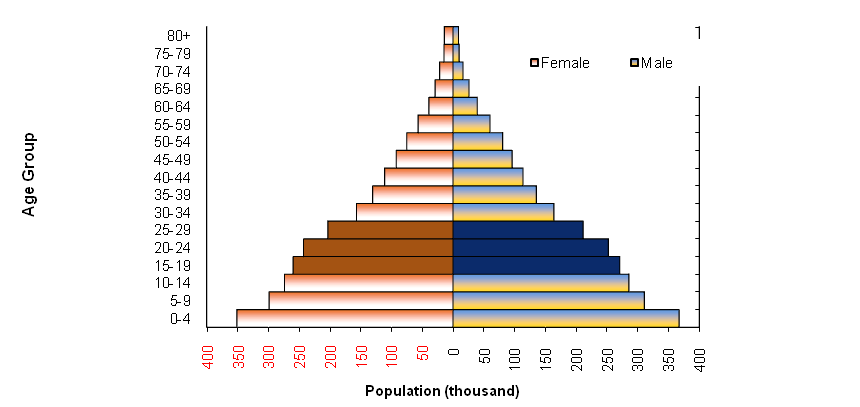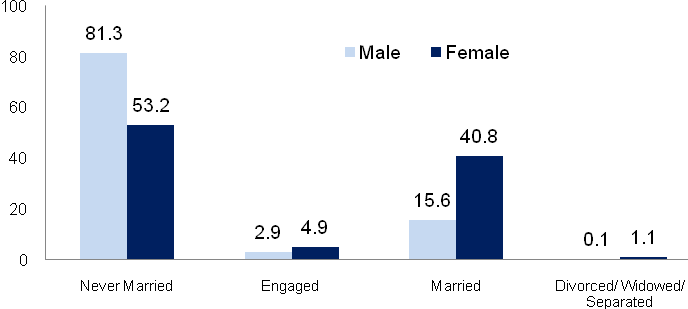Palestinian Central Bureau of Statistics (PCBS)
International Youth Day,12/08/2016
On the eve of International Youth Day, the PCBS releases a statistical review on the status of Palestinian youth:
Youth comprise one third of Palestinian Society
In mid-2016 the total population of Palestine is estimated at 4.82 million. Youth represent 30% of this total: 37% are adolescents aged (15-19) years and 63% are young adults aged (20-29) years. While the sex ratio among youth is at 104.1 males to 100 females.
Population Pyramid in Palestine, Mid-2016

7 of 10 households in Palestine have at least one young person
The 2015 census data of Palestinian youth shows the percentage of households headed by a young person aged (15-29 years) reached 14%, 13% of which are in the West Bank and 17% in Gaza Strip. The data also showed that 72% of households have at least one young person;71% in the West Bank and 74% in Gaza Strip.
41% of females aged (15-29) years are married
Palestinian Youth Survey 2015, data showed that 68% of youth aged (15-29) years have not been married before, 4% were engaged for the first time, and 28% were married (16% males to 41% females), while 1% were widowed, divorced or separated. The percentage of married youth reached 26% in the West Bank compared to 32% in Gaza Strip.
Percentage Distribution of the youth (15-29) years by Marital Status and Sex, 2015

Females in the aged (25-29) years are the highest contributors to the total fertility rate
According to the results of the Multiple Indicator Cluster Survey of 2014, the total fertility rate in Palestine declined to 4.1 births between (2011-2013) compared to 4.4 births in 2010. On a regional level, the total fertility rate in the West Bank was 3.7 births in the years (2011-2013) compared to 4.5 births in Gaza Strip for the same period. Females aged (25-29) years contribute to 30.1% of the total fertility rate, making them the highest contributors of all age groups.
Age-Specific Fertility Rates by Region, 2011-2013

4 out of 10 youth were unemployed during the 1st quarter 2016
Labor force data for the 1st quarter of 2016 showed that 41% of youth aged (15-29) years are economically active (employed and unemployed);40% in the West Bank and 42% in Gaza Strip.
While youth unemployment rate reached 39%. The highest unemployment rate was among youth aged (20-24) years reaching 43% compared to 39% for youth aged (25-29) years and 35% for youth aged (15-19) years. The highest unemployment rate among youth who have not completed any grade level reached 55%.
The unemployment rate among youth graduates was 51% in the 1st quarter of 2016. The highest unemployment rate was 64% for graduates in education and teacher training, while the lowest unemployment rate of 25% was among law graduates.
16% of youth have completed the transition from education to the labor market
In 2015, the survey of transition of youth from school to the labour market results showed that 16% of youth people aged (15-29) years have completed the transition from education to the labor market to work in stable jobs and permanent, while 84% of young people have moved out of the labor force, or unemployed, or to the work of non-permanent temporary lasting less than 12 month
More than half of youth population aged (15-29) years in Gaza report interest in participating in an election event
40% of youth aged (15-29) years reported interest in participating in an elections event (29% in the West Bank, compared to 57% in Gaza Strip). While 29% reported they would probably participate, 13% said they would probably not participate and 18% said they definitely would not participate (16% in the West Bank and 21% in Gaza Strip) according to Palestinian Youth Survey 2015.
39% of youth ages (15-29) years were enrolled in education
In 2015, 39% of youth aged (15-29) years were enrolled in education; 82% of those are within the age group (15-17) years, 46% are in the age group (18-22) years, and 9% in the age group (23-29) years. Dropout rates (those who left the educational system before the completion of the educational stage attended) reached 34%; of which 41% are males and 27% are females. Moreover, in the year 2013-2014 dropout rate in the secondary education reached 3.7% among youth aged (15-29) years (4.2% males, 3.3% females).
Most youth who have attended higher education chose their university or college
Findings of the 2015 Youth Census Data showed that 88% of youth aged (17-29) years who have attended higher education had chosen their university/college themselves (90% of those males to 87% females). On the other hand, 6% of youth in that same age group attended a university chosen for them by their family. Findings also show that 6% of youth in the same age group had chosen a university/ college based on their general certificate score.
4 of 100 youth have difficulty / disability
Palestinian Youth Survey 2015, Data showed that the percentage of youth (15-29) years who face difficulty/ disability was 3.6%, 3.7% in the West Bank and 3.6% in the Gaza Srip. The percentage of males with difficulty/ disability was 4.9% compared to 2.3% of females.
Percentage of Youth (15-29) years by the Presence of Difficulty / Disability, Sex and Region, 2015
|
Sex |
Palestine |
West Bank |
Gaza Strip |
|
Both sexes |
3.6 |
3.7 |
3.6 |
|
Males |
4.9 |
4.6 |
5.3 |
|
Females |
2.3 |
2.7 |
1.5 |
2 of 10 male youth smoke
Palestinian Youth Survey 2015, data showed that 24% of youth smoked, 30% in the West Bank versus 14% in Gaza Strip. Gender variances were high with 41% of males smoking compared to 5% of females.
Percentage of Youth (15-29) years Smokers by Sex and Region, 2015
|
Sex |
Palestine |
West Bank |
Gaza Strip |
|
Both sexes |
23.5 |
29.5 |
14.0 |
|
Males |
40.9 |
49.5 |
26.6 |
|
Females |
5.4 |
8.1 |
1.0 |
2 of 10 youth in Palestine participated in volunteer work
Palestinian Youth Survey 2015, data showed that youth aged (15-29) years who participated in volunteer work in the year 2014 reached 20%. 11% of those participated in non-financial charity activities (helping the poor or hardship cases), while 7% contributed to community development activities, 5% to educational activities, 6% to fundraising and 1% in other volunteer work.
Percentage of Youth (15-29) years by Participating in Volunteer Activities during the previous year of the survey, Sex and Region, 2015
|
Sex |
Palestine |
West Bank |
Gaza Strip |
|
Both sexes |
19.6 |
18.1 |
21.8 |
|
Males |
26.0 |
23.5 |
30.0 |
|
Females |
12.8 |
12.5 |
13.3 |
7 of 10 youth in Palestine use computers
Palestinian Youth Survey 2015, data shows that the percentage of youth (15-29) years who use a computer reached 70% (75% in the West Bank, compared to 62% in Gaza Strip). Of those 74% were males compared to 66% females.
Data shows that male youth tend to use the Internet more than females and are therefore more familiar with it
Regarding knowledge and use of the Internet, Palestinian Youth Survey 2015, shows that 70% of youth (15-29) years reported they know and use the Internet compared to 23% who were aware of it but did not use it . The percentage of youth, not aware and not using this service reached 7% of total Palestinian youth. The percentage of youth who know of and use the Internet was 75% in the West Bank compared to 61% in Gaza Strip. 75% were males, while 65% were females.
2 of 10 youth in Palestine desire to immigrate abroad
Palestinian Youth Survey 2015,show that 24% of youth aged (15-29) years desire to migrate abroad and that the overall conditions in Gaza Strip play a major role in increasing the percentage of youth desiring to migrate abroad (37% in Gaza Strip and 15% in the West Bank). It should be noted that young males have a greater tendency to think of immigration (29% males, versus 18% females).
6 of 10 youth in Palestine are considering temporary immigration
Results also show that 63% of youth (15-29 years) who wish to immigrate do not consider permanent immigration . They represented 73% in the West Bank and 56% in Gaza Strip. The percentage of females exceeded the percentage of males in their preference for temporary immigration, (62% of males, compared to 64% of females).
 عربي
عربي